SUNSET BOULEVARD
“Sunset Boulevard” is a classic film noir from 1950 that tells the story of a struggling screenwriter who becomes entangled in the delusional world of a former silent film star. Directed by Billy Wilder and starring William Holden and Gloria Swanson, the movie explores the dark side of Hollywood and the devastating effects of fame and obsession. With its haunting themes and memorable performances, Sunset Boulevard remains a timeless masterpiece of cinema.

Director: Billy Wilder
Year: 1950
Stars: William Holden, Gloria Swanson
Awards: Nominated for 11 Oscars. Won 3.
PLOT
Sunset Boulevard tells the story of a down-on-his-luck screenwriter named Joe Gillis, who is struggling to make ends meet in Hollywood. One day, while being chased by repo men, he stumbles upon a dilapidated mansion on Sunset Boulevard, where he meets the eccentric and reclusive former silent film star Norma Desmond.
Desmond, played by Gloria Swanson, lives in a world of delusion and has convinced herself that she is still a great actress, even though she hasn’t worked in years. She hires Joe to help her write a screenplay for her big comeback, and he agrees, lured in by the promise of money and the luxurious lifestyle that Desmond offers.
As Joe spends more time with Desmond, he becomes increasingly entangled in her delusional world, which is fueled by her butler and former director, Max von Mayerling. The butler keeps Desmond’s illusions alive by showing her old films and showering her with praise, but he also harbors a dark secret from her past.
As the screenplay progresses, Joe becomes increasingly uncomfortable with the situation and tries to leave, but Desmond becomes obsessed with him and won’t let him go. When Joe falls in love with a young script reader named Betty, played by Nancy Olson, Desmond becomes jealous and threatens to kill herself if he leaves her.
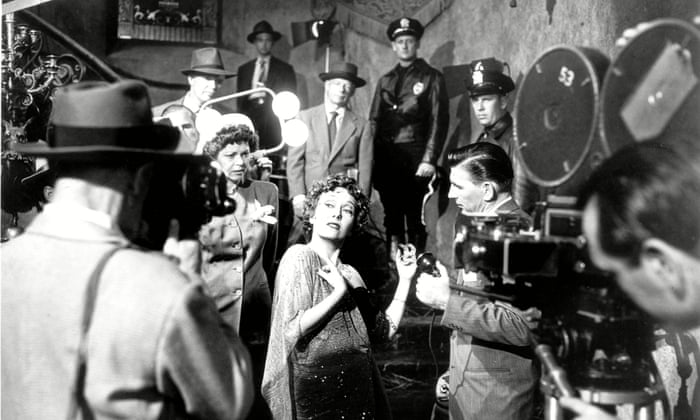
In the climactic scene, Desmond confronts Joe in the mansion’s grand foyer, dressed in a dramatic outfit and wielding a revolver. She shoots him as he tries to leave, and he falls into the pool, dead. In the final scene, the newsreel reporters arrive to cover the story, and Desmond descends the grand staircase, believing that she is on her way to fame and glory once again, as the camera pans out to reveal her surrounded by the police.
THEMES
Sunset Boulevard is a complex and multi-layered film that explores a variety of themes, from the corrosive effects of fame to the destructive power of obsession. Below is a detailed rundown of some of the key themes in the film:
The Dark Side of Hollywood
Sunset Boulevard is a scathing critique of the Hollywood system and the cult of celebrity. The movie exposes the ruthless and cutthroat nature of the film industry, where people are discarded once they are no longer useful. It also portrays the dark and destructive effects of fame, which can drive people to madness and despair.
Obsession
The movie’s central character, Norma Desmond, is consumed by her obsession with her own past and her delusional belief that she is still a great actress. This obsession leads her to manipulate and control those around her, ultimately leading to tragedy.
The Illusion of Control
Sunset Boulevard explores the idea that people often create elaborate illusions to protect themselves from the harsh realities of life. Norma Desmond constructs an elaborate fantasy world in which she is still a famous movie star, and her butler, Max, helps to perpetuate this illusion. However, as the movie progresses, it becomes clear that this illusion is fragile and unsustainable.
The Power of Memory
The movie also explores the power of memory and nostalgia. Norma Desmond is obsessed with her past and her former glory, and she spends much of her time watching old films and reminiscing about her past successes. However, this nostalgia ultimately proves to be a trap that prevents her from moving on with her life.
The Fragility of Masculinity
Sunset Boulevard portrays the male protagonist, Joe Gillis, as a man struggling with his own sense of masculinity. He is emasculated by his financial struggles and his dependence on Norma Desmond for money. This insecurity is further exacerbated by his relationship with Betty, who is a strong and independent woman.
The Power of the Female Gaze
The movie also explores the power dynamics of gender and the concept of the female gaze. Norma Desmond is a powerful and commanding presence throughout the movie, and she often objectifies and fetishizes Joe Gillis. However, as the movie progresses, it becomes clear that this power dynamic is not as straightforward as it first appears.
GLORIA SWANSON
Gloria Swanson’s performance in Sunset Boulevard is widely regarded as one of the greatest performances in the history of cinema Swanson’s portrayal of Norma Desmond is both larger-than-life and deeply human, as she brings a complex and multi-dimensional character to life on screen.
Swanson’s performance captures Norma Desmond’s grandeur and delusion, but also highlights her deep sense of loneliness and isolation. The character is desperate for attention and validation, and Swanson portrays this need with a sense of authenticity that makes her performance all the more powerful.

One of the most impressive aspects of Swanson’s performance is her ability to convey the character’s emotional turmoil without resorting to melodrama or overacting. She plays Norma Desmond with a sense of restraint and nuance, allowing the character’s emotions to bubble beneath the surface in a way that feels natural and authentic. Swanson’s performance is also notable for the way she captures the character’s increasing madness and delusion as the film progresses, culminating in the iconic final scene that has become one of the most memorable moments in cinema history.
Swanson’s performance is a testament to her talent and dedication as an actress. She was initially hesitant to take on the role of Norma Desmond, but ultimately embraced the challenge and delivered a performance that has cemented her place as one of the greatest actresses of all time. Her ability to bring such depth and complexity to the character has made Norma Desmond one of the most iconic characters in cinema history, and Swanson’s performance is a key reason why Sunset Boulevard remains a timeless classic that continues to resonate with audiences today.
RECEPTION
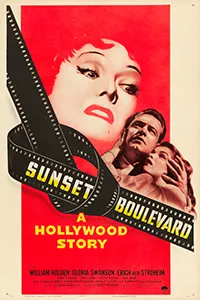 When Sunset Boulevard was first released in 1950, it was met with both critical acclaim and commercial success. The film was praised for its innovative storytelling, its exploration of Hollywood’s dark side, and its powerhouse performances from its lead actors, Gloria Swanson and William Holden.
When Sunset Boulevard was first released in 1950, it was met with both critical acclaim and commercial success. The film was praised for its innovative storytelling, its exploration of Hollywood’s dark side, and its powerhouse performances from its lead actors, Gloria Swanson and William Holden.
Critics at the time praised director Billy Wilder for his daring approach to the film’s narrative structure, which begins with the protagonist’s death and then uses flashbacks to tell the story leading up to it. Many critics also noted the film’s sharp and incisive commentary on Hollywood’s obsession with youth and beauty, and the price that people are willing to pay to achieve fame and success in the film industry.
The film’s lead actors, Gloria Swanson and William Holden, also received widespread acclaim for their performances. Swanson’s portrayal of the faded silent film star Norma Desmond was seen as a breakthrough performance, showcasing her ability to play a complex and multi-layered character. Holden’s performance as Joe Gillis, the struggling screenwriter who becomes entangled with Norma, was also highly praised for its realism and emotional depth.
Sunset Boulevard was also a commercial success, grossing over $5 million at the box office and becoming one of the highest-grossing films of the year.
The film was seen as a groundbreaking and innovative work that pushed the boundaries of traditional storytelling and explored themes that were rarely addressed in mainstream Hollywood films at the time.
Its critical and commercial success helped establish director Billy Wilder as one of the most important and influential filmmakers of his generation, and cemented Gloria Swanson and William Holden’s place as two of the most talented and respected actors of the era.
AWARDS
The film was nominated for no less than eleven Academy Awards in 1951, winning three.
The film was nominated for Best Picture, Best Director for Billy Wilder, Best Actor for William Holden, Best Actress for Gloria Swanson, Best Supporting Actor for Erich von Stroheim, Best Screenplay, Best Cinematography, Best Art Direction, Best Film Editing, Best Sound Recording, and Best Music.
Gloria Swanson’s performance as Norma Desmond was widely praised, and she was considered a frontrunner for the Best Actress award. While she did not win, she did receive critical acclaim for her portrayal of the tragic and delusional character.
Erich von Stroheim’s performance as Max von Mayerling, Norma Desmond’s butler and former husband, was also highly praised, and he received a nomination for Best Supporting Actor.
The film ultimately won three Academy Awards, including Best Screenplay for Billy Wilder, Charles Brackett, and D.M. Marshman Jr., Best Art Direction for Hans Dreier, John Meehan, and Sam Comer, and Best Music for Franz Waxman.
In addition to its success at the Academy Awards, Sunset Boulevard was also nominated for four Golden Globe Awards, including Best Motion Picture – Drama, Best Director for Billy Wilder, Best Actor for William Holden, and Best Actress for Gloria Swanson. The film ultimately won the award for Best Motion Picture – Drama.
Sunset Boulevard has also been recognized by numerous film organizations and critics over the years. In 1989, it was selected for preservation in the United States National Film Registry by the Library of Congress for being “culturally, historically, or aesthetically significant.” The film has also been included on numerous “best films of all time” lists, including the American Film Institute’s 100 Years…100 Movies and Sight & Sound’s decennial critics’ poll.
POPULAR CULTURE
Sunset Boulevard is a classic film that has had a significant impact on popular culture. From its memorable characters and iconic scenes to its exploration of the dark side of Hollywood, the movie has influenced a wide range of media over the years:
Homages and Parodies: Sunset Boulevard has been referenced and parodied in countless films, TV shows, and other media. For example, the 1992 film The Player features a character who is obsessed with the movie and even dresses like Norma Desmond. Other films that have referenced Sunset Boulevard include The Big Lebowski, The Truman Show, and Mulholland Drive. The Simpsons also famously parodied the movie in an episode titled “A Star Is Burns.”
Music: The movie has also had an impact on the world of music. The British band Dire Straits released a song in 1985 called “Les Boys” that includes the line “All they got inside is vacancy” – a reference to a famous line from Sunset Boulevard. The song “Sunset Strip” by Courtney Love’s band Hole also references the movie.
Broadway: In 1994, Sunset Boulevard was adapted into a stage musical, which went on to become a hit on Broadway. The musical starred Glenn Close as Norma Desmond and was praised for its faithful adaptation of the movie.
Pop Art: The movie has also been referenced in a variety of pop art pieces over the years. For example, Andy Warhol created a series of prints featuring images of Norma Desmond, and the artist David LaChapelle has also referenced the movie in some of his work.
Influence on Film Noir: Sunset Boulevard is considered one of the defining films of the film noir genre, and its influence can be seen in countless movies that have come after it. The movie’s exploration of the dark side of Hollywood and its portrayal of flawed and complex characters has become a hallmark of the genre.
Explore more Film Noir
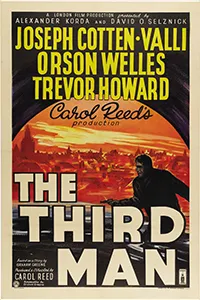
Classic film noir set in post-WWII Vienna, where a writer investigates the mysterious death of his friend.
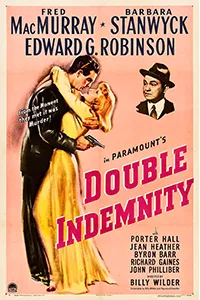
A gripping film noir about a seductive woman who convinces an insurance salesman to plot a murder. Also directed by Billy Wilder.
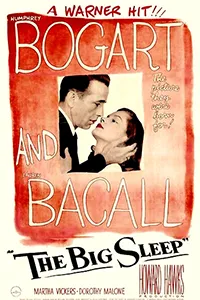
This classic film noir follows private detective Philip Marlowe as he investigates a complex case involving a wealthy family.